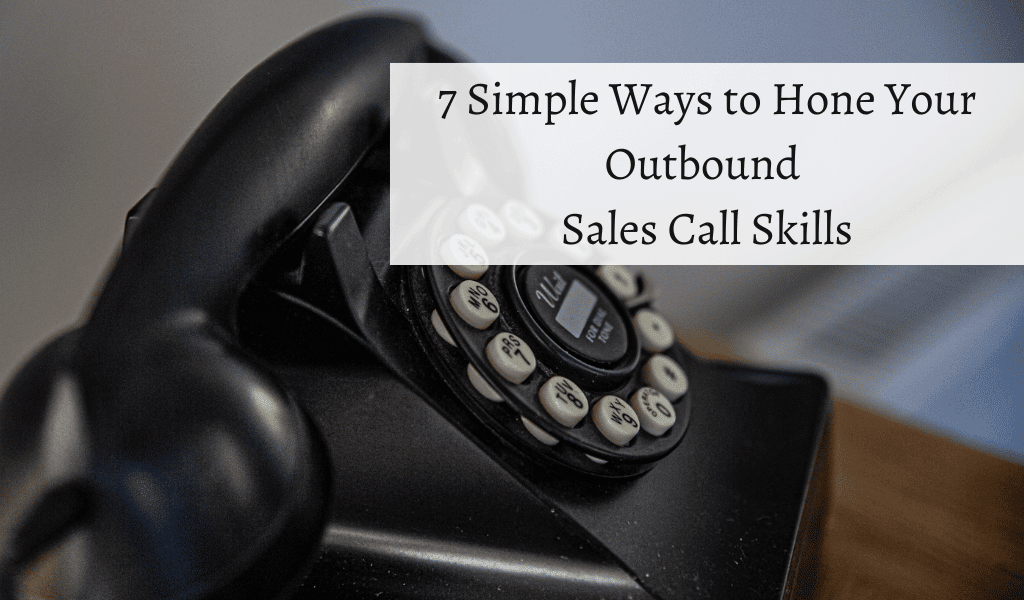Are your outbound sales call skills a little lacking? Here are 7 simple ideas to sharpen those skills and boost your numbers.
One of the not-so-secret secrets in sales is that each outbound sales call you make will most likely go to voicemail. And when you do get through to speak with someone, your chances of reaching a decision maker are slim.
Then, of course, you never know what to expect and need to be prepared for anything from a friendly chat to an abrupt request for an email.
As unfortunate as this might seem, it’s actually good. Why? Because when you break it all down, there are only a handful of outbound sales call scenarios. Either you’ll leave a message (voicemail or otherwise), talk to someone interested in your product or service, talk to someone interested but in a hurry, or speak with someone who is not interested.
There may still be some variations, but working with these larger categories makes it less daunting to work on a strategy. And once you get the basic ideas down, they’re easy enough to adapt to specific situations.
Call Logic’s auto-dialer and call management software offers dozens of helpful tools to increase your success and simplify your daily tasks. Call for your free consultation today to learn more!
7 Outbound sales call skills upgrades you can put in action today
1. Leave a message. Sure, it sounds simple, but do you leave a message whenever you connect to voicemail? You already know that most of your calls will go to voicemail, so you have every reason to be prepared for this. Perhaps you’re thinking that you’ve already called two or three times and left a message, and you don’t want to seem pushy. That’s understandable, but as long as you aren’t calling every hour or leaving messages that sound irritated, it’s fine. Maybe you have a series of messages that change depending on whether this is the first call or if you’ve left several messages already. In any case, be prepared and leave a message.
2. Practice your calls. The only way to make the perfect outbound sales call is to practice making the perfect outbound sales call. Professionals in all industries practice, so why not practice your calls? It’s a great way to get used to going over your script. And when you practice with other sales reps, they understand what kind of conversations you may have, which means they can push you to do better.
3. Plan for objections. Objections are part of sales. Over time, however, you’ll find that there are some objections you run into regularly. Sit down with these rejections and determine how you’ll respond to them. For example, finances are a common objection on an outbound sales call. So what are your options when you run into that? You can try to sell on value vs. price. Maybe you can offer a payment plan. Perhaps you have the ability to negotiate the price. Now go through all of your common objections and come up with solutions, so you’re ready when that happens in reality. By the way, one objection is that it’s simply not a good time to talk. Respect that and try to schedule a time for a call.
4. Don’t badmouth the competition. There are all sorts of psychological reasons not to make negative comments about your competition. But at the most basic level, it’s just poor form.
5. Focus on benefits, not features. This could be a subtle difference, but features are about you or your product, whereas benefits are what your prospect gets out of the deal. For example, heated seats in a car are a feature, while keeping your backside warm in the middle of winter is a benefit.
6. Personalize your follow-up. Whether your follow-up is a phone call or an email, your customers and prospects expect a personalized response to previous interactions. That means answers to their specific questions, a service or product package designed just for them, or even something as simple as sticking to their preferred method of contact, like texting or a personal or work email address.
7. Relax. This is one outbound sales call skill that sounds easy enough on the surface. As you probably know, however, phone sales can be stressful. Here’s the problem, though. Anxiety and stress come through in your voice, which gives customers and prospects pause. In turn, that hesitation creates more anxiety and stress. It’s a vicious circle. If you can relax while you’re talking to prospects, you’ll project a measure of confidence and trustworthiness. What does that mean? A relaxed demeanor doesn’t mean sitting back with your feet up. You still need to be professional even if the person on the other end of the line can’t see you. This is more of a mental relaxation. Take some time before calls to take a few deep breaths, go for a short walk, or do some stretching. These little things can help dissipate anxiety and stress and help you sound more like someone your prospect wants to do business with.
Ultimately, the goal is that you want to set yourself up as the person to do business with. The more you can do to create that situation, both on calls, in emails, and and in-person meetings, the better you’ll be able to serve your customers and enjoy your own success.
Make more calls in less time with Call Logic. From donor profile management to automated voicemails to built-in compliance, we’ve got you covered in every aspect of your business. Call for your free consultation today to learn more!

